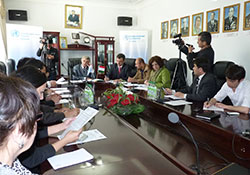Tajikistan

WHO
On 6 April 2012, the WHO Country Office in Tajikistan and the Ministry of Health held an official press conference on ageing and health to mark World Health Day. In addition to the press conference, the WHO Country Office organized a scientific forum in collaboration with the Tajik State Medical University and a series of educative and public awareness radio broadcasts.
Population ageing in Tajikistan
In the period 2000 to 2050, the proportion of the global population aged 60 and over will double from 11% to 22%. This reflects an increase in the number of people in this age group from 605 million to 2 billion. Although population ageing is not yet a major problem in Tajikistan, the country has already reached what can be called an ageing threshold (5.1% of the population is aged 60 and over). In 2000, average age in Tajikistan was 22.9 years and the median age was 18.2 years; by 2010 average age had increased to 25.3 years and median age to 21.5.
“Careful monitoring of health, maintaining healthy lifestyles and active ageing can be a good basis for future success in favour of good health", highlighted the Deputy Minister of Health during the press conference.
“Factors such as alcohol and tobacco use, poor diet, and failure to follow a healthy and active lifestyle - can be a cause of premature mortality and chronic diseases. I would like to stress the importance of promoting healthy lifestyles and creating favourable conditions for all segments of society, in particular those who are older and vulnerable,” noted WHO Representative, Dr Pavel Ursu.
Preserving good health is indeed not the only factor of concern for people as they age. Although older people make significant economic and social contributions, negative attitudes and common stereotypes related to ageing often prevent them from participating fully in society. According to recent surveys, older people represent one of the most vulnerable and socially excluded groups in Tajik society. Poverty alleviation and further economic growth therefore continue to be priorities for healthy ageing in Tajikistan.



